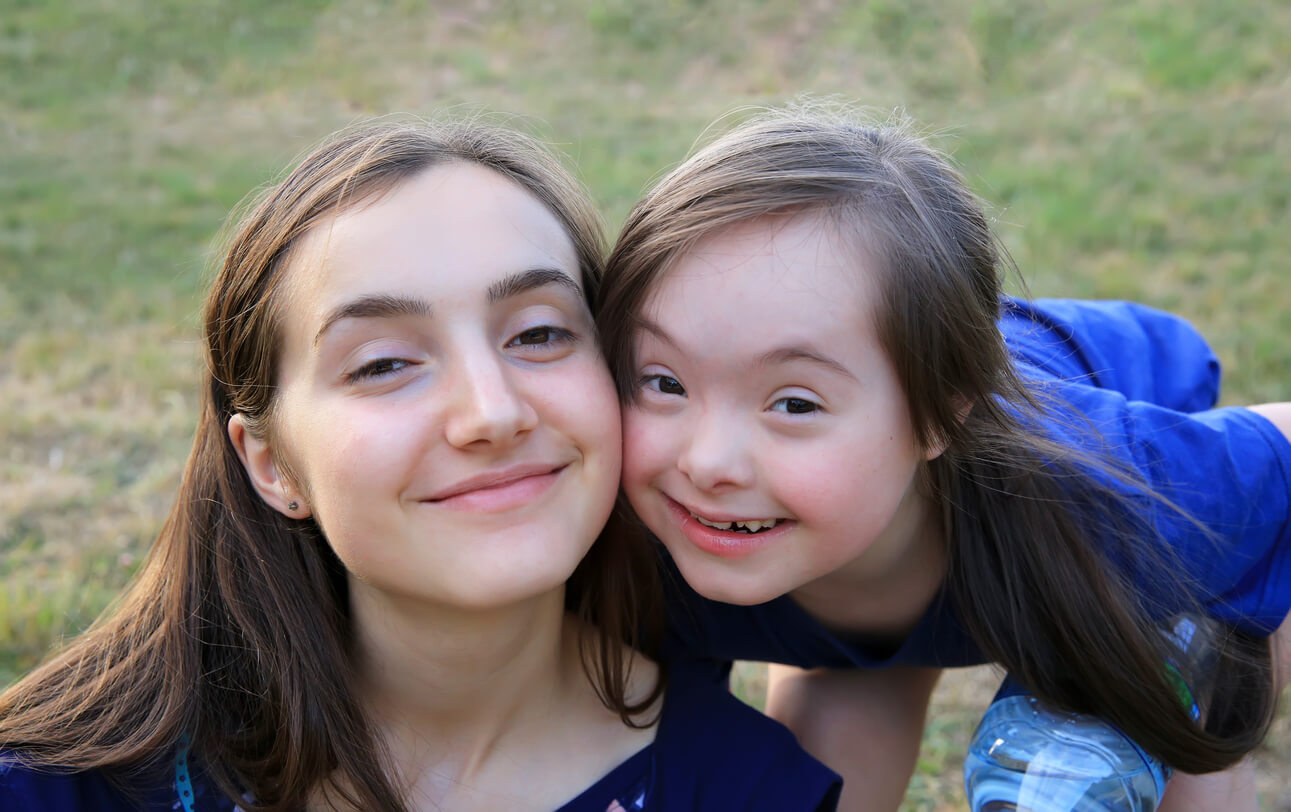6 Benefits of Sports for Children with Down Syndrome


Written and verified by degree in physical education and sports Andrés Felipe Cardona Lenis
Generally, children with Down syndrome tend to be overprotected by their parents or caregivers. However, beyond protecting your child, it’s important for them to explore the world in their own way. Therefore, one of the best options is sports, not only because it has a high content of physical activity, but also because it’s an option with which they can obtain great benefits. Sports are a fundamental part of children’s lives. Therefore, we’ll show you a series of positive aspects of sports for children with down syndrome in the following article.
The physical benefits of sports for children with Down syndrome
Among the physical benefits of sports for children with Down syndrome are muscle strengthening and preventing a sedentary lifestyle. However, physical activity goes far beyond strengthening and leisure time, which is why it’s crucial to include it in your children’s routine.
1. Cardiovascular benefits
Playing sports on a regular basis promotes heart rate and blood circulation. These factors contribute to reducing the probability of diseases such as ischemic heart disease and heart attack.
Moreover, the heart and circulatory system are gradually strengthened. This means that the probability of developing hypertension and other conditions related to sedentary lifestyles also decreases.

2. Hematological benefits of sports for children with Down syndrome
Although the hematological benefits go hand in hand with the cardiovascular system, it’s still important to emphasize the benefits of sports practice. With respect to these, the most advisable thing is that the sports routine is designed by a professional. The idea is that both the intensity and duration should be optimal for your child.
Based on this, the benefits in blood cell production could be much more appropriate. In addition, the likelihood of blood-related diseases, such as thrombosis, would decrease.
3. Metabolic benefits
Children with Down syndrome should engage in sports on a regular basis because of the metabolic benefits it offers. Remember that metabolism is present in all physiological processes. One of the main benefits is the regulation of cholesterol. Moreover, glucose tolerance is also increased.
Psychosocial benefits for children with Down syndrome
Some children with Down syndrome have difficulties in the social sphere. However, sports can help to reduce inhibitions in this area and promote interpersonal relationships. At the same time, there’s also the possibility for your child to strengthen psychological processes through sport. Do you want to know the benefits in this regard?
4. Self-esteem and self-discovery
Overprotection in children in general interrupts the process of physical and psychological development. At this point, the idea is that the child has the opportunity to break the chains of overprotection through sports.
In this regard, it’s likely that the child will begin to discover what skills they have and how they can apply them. Undoubtedly, self-esteem will also be affected in a positive way.

5. Social relationships
As mentioned above, one of the main benefits of practicing sports on a social level is the improvement of interpersonal relationships.
In addition, not only can your child create bonds of friendship or coexistence. It’s also likely that they’ll learn social roles of authority, which are necessary. A clear example of this is the understanding that their teacher or coach is the one who directs the training, therefore, they’re a figure that deserves respect.
6. Autonomy
Regarding the benefit of autonomy, you shouldn’t be alarmed. It’s clear that it’s difficult to detach yourself from your child, but you shouldn’t anchor yourself to them or turn them into a totally dependent person.
In order for them to begin to build or strengthen the processes of autonomy, supporting them in the decision to practice any sport is fundamental. Remember that one way to take care of them is to encourage them to improve and do things on their own.
How to obtain the benefits for children with Down syndrome?
The first step to obtaining the physical and psychosocial benefits of sports is to allow the child to choose a practice that they like. Focusing on their enjoyment is essential to reap the benefits.
At the same time, it’s also important that the classes are taught by professionals. Last but not least, accompaniment and motivation on your part will help your child to take the next step.
Generally, children with Down syndrome tend to be overprotected by their parents or caregivers. However, beyond protecting your child, it’s important for them to explore the world in their own way. Therefore, one of the best options is sports, not only because it has a high content of physical activity, but also because it’s an option with which they can obtain great benefits. Sports are a fundamental part of children’s lives. Therefore, we’ll show you a series of positive aspects of sports for children with down syndrome in the following article.
The physical benefits of sports for children with Down syndrome
Among the physical benefits of sports for children with Down syndrome are muscle strengthening and preventing a sedentary lifestyle. However, physical activity goes far beyond strengthening and leisure time, which is why it’s crucial to include it in your children’s routine.
1. Cardiovascular benefits
Playing sports on a regular basis promotes heart rate and blood circulation. These factors contribute to reducing the probability of diseases such as ischemic heart disease and heart attack.
Moreover, the heart and circulatory system are gradually strengthened. This means that the probability of developing hypertension and other conditions related to sedentary lifestyles also decreases.

2. Hematological benefits of sports for children with Down syndrome
Although the hematological benefits go hand in hand with the cardiovascular system, it’s still important to emphasize the benefits of sports practice. With respect to these, the most advisable thing is that the sports routine is designed by a professional. The idea is that both the intensity and duration should be optimal for your child.
Based on this, the benefits in blood cell production could be much more appropriate. In addition, the likelihood of blood-related diseases, such as thrombosis, would decrease.
3. Metabolic benefits
Children with Down syndrome should engage in sports on a regular basis because of the metabolic benefits it offers. Remember that metabolism is present in all physiological processes. One of the main benefits is the regulation of cholesterol. Moreover, glucose tolerance is also increased.
Psychosocial benefits for children with Down syndrome
Some children with Down syndrome have difficulties in the social sphere. However, sports can help to reduce inhibitions in this area and promote interpersonal relationships. At the same time, there’s also the possibility for your child to strengthen psychological processes through sport. Do you want to know the benefits in this regard?
4. Self-esteem and self-discovery
Overprotection in children in general interrupts the process of physical and psychological development. At this point, the idea is that the child has the opportunity to break the chains of overprotection through sports.
In this regard, it’s likely that the child will begin to discover what skills they have and how they can apply them. Undoubtedly, self-esteem will also be affected in a positive way.

5. Social relationships
As mentioned above, one of the main benefits of practicing sports on a social level is the improvement of interpersonal relationships.
In addition, not only can your child create bonds of friendship or coexistence. It’s also likely that they’ll learn social roles of authority, which are necessary. A clear example of this is the understanding that their teacher or coach is the one who directs the training, therefore, they’re a figure that deserves respect.
6. Autonomy
Regarding the benefit of autonomy, you shouldn’t be alarmed. It’s clear that it’s difficult to detach yourself from your child, but you shouldn’t anchor yourself to them or turn them into a totally dependent person.
In order for them to begin to build or strengthen the processes of autonomy, supporting them in the decision to practice any sport is fundamental. Remember that one way to take care of them is to encourage them to improve and do things on their own.
How to obtain the benefits for children with Down syndrome?
The first step to obtaining the physical and psychosocial benefits of sports is to allow the child to choose a practice that they like. Focusing on their enjoyment is essential to reap the benefits.
At the same time, it’s also important that the classes are taught by professionals. Last but not least, accompaniment and motivation on your part will help your child to take the next step.
All cited sources were thoroughly reviewed by our team to ensure their quality, reliability, currency, and validity. The bibliography of this article was considered reliable and of academic or scientific accuracy.
- Bonilla Briceño, J. F. (2005). Respuesta hematológica al ejercicio. Revista Ciencias de La Salud.
- Pineda, A. I. P., & Garcia, B. M. G. (2010). Síndrome de Down y deporte. Efdeportes.
This text is provided for informational purposes only and does not replace consultation with a professional. If in doubt, consult your specialist.








